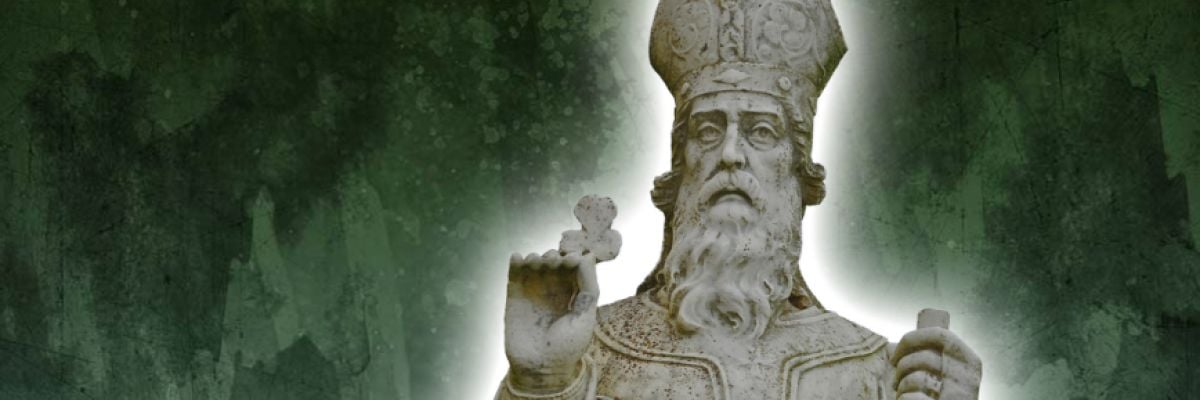
“I, Patrick, am a sinner; the most uncultured and smallest among all the faithful, indeed many people consider me to be worthless.” — St. Patrick, Confessio
Those might be surprising words from a man we remember with one of the most raucous and celebrated holidays in America, turning rivers green with dye and streets green with revelers. But how many people who gather to celebrate (or over-celebrate) the Feast of St. Patrick have a clue as to who he really was or the magnitude of the things he accomplished?
Patricius (c. 387-461), as he called himself (the Irish called him Padraig), was a man full of surprises. The future patron saint of Ireland was not even Irish; but he certainly was Catholic, and he was so adept at winning over others to Christ that he converted an entire nation within one generation, giving birth to an island of scholars and saints who would for centuries evangelize other nations to the ends of the Earth, with no small impact here in America.
Although the “ancient lives” of St. Patrick—hagiographies written in medieval times—contain countless fascinating legends of this spiritual conqueror, we are blessed with two small compositions from the hand of Patrick himself: the short Letter to Coroticus, correcting a British chieftain who had killed and enslaved Christians; and his brilliant Confessio, just twenty-five pages or so in a modern book.
The Confessio is a defense of his missionary work in Ireland in response to accusations leveled against him by some prelates in England (who, he says, considered him “worthless”). How intriguing to see the conqueror of Druids, converter of a nation, banisher of demons, raiser of the long dead, worker of sundry miracles, and bearer of the staff of Christ being criticized by the Church!
But these accusations are dwarfed by the testimonies to his saintliness. And it is by the words of St. Patrick himself that we can come to understand the secrets of his holiness and his success, the God-given spiritual weapons of evangelization that we ourselves might seek to add to our own armaments. Let’s focus on three key spiritual weapons St. Patrick used to convert a nation and impact a planet.
Unceasing Prayer
Patrick was born at Bannavem Taburnaie (“the field of the tents”) somewhere on the island that now comprises Great Britain. His first visit to the island just to the west was as a slave, courtesy of Irish pirates. Though he was the son of a deacon, Patrick did not take his faith seriously until after he was kidnapped before age sixteen. Then, forced to tend sheep in the mountains of Ireland, Patrick would pray as many as a hundred times a day and as many times at night, getting up before dawn, praying undauntedly.
It was during these years of incessant prayer that he grew in fear and love of God. He prayed for his freedom and deliverance from Ireland, which was not to come for nearly seven years, and his prayer life continued to grow after that. He describes how many times the Holy Spirit would cry out and pray on his behalf as he described in the words of Romans 8:26: “The Spirit helps us in the weakness of our prayer. For we do not know how we ought to pray, but the Spirit himself intercedes on our behalf with groaning that cannot be put into words.”
Immersion in Scripture
In the mere sixty-two paragraphs of Patrick’s Confessio scholars have found more than 300 scriptural citations or allusions. When Patrick returned home to England, he so immersed himself in the Scripture of the Latin Vulgate that it formed and colored his thought, words, and very life. (A son of the Church, he also displays his familiarity with the teachings of early Church councils and the writings of St. Augustine.)
Consider this scriptural example. Patrick wrote that he traveled about 200 miles from the site of his captivity to the beach where a ship carried him to freedom. Scholars for centuries have gone to their maps attempting to deduce the exact locations of the two sites. Note, though, that Revelation 14:20 uses “one thousand six hundred stadia” to denote a great distance. That distance translates to 200 Roman miles. And so, rather than providing an exact distance, Patrick was likely expressing in his scriptural manner of thought that his journey was a long one, and one that was guided by God.
A delightful example of Patrick’s immersion in Scripture is preserved in the ancient lives. When his Druid priests warned O’Leary, high king of Ireland, of St. Patrick’s arrival and how it boded ill for the fate of their pagan religion, he sent forth “thrice-nine” chariots to intimidate the saint, whereupon Patrick recited aloud: “Some boast of chariots, and some of horses; but we boast of the name of the Lord our God” (Psalm 20:7).
The Virtue of Perseverance
St. Patrick was strong in the theological virtues of faith, hope, and charity, and in the cardinal virtues of prudence, justice, temperance, and fortitude. Fortitude is the virtue that allows us to overcome obstacles to achieve great goods; and perseverance, one of its allied virtues, gives us the ability to endure hardships over time. Although St. Patrick prayed for seven years to escape from captivity in Ireland, immediately after describing his return home in the Confessio he writes of a call from “the voice of the Irish” and his burning desire to go back and bring Christ’s gospel message to them.
It took Patrick decades to complete his education, become a priest and then a bishop, achieve papal endorsement, and assemble a team that could build up the Church in Ireland. Indeed, he did not return there until his forties or fifties, but when he did he made his way through every province of Ireland. It took hundreds of new wooden churches to hold all the bodies and souls God won through him.
A Happier, Holier St. Patrick’s Day
One of the joys of being Catholic is our recognition of the communion of saints, the holy men and women who can intercede for us and inspire us. We can make this St. Patrick’s Day happier and holier than ever by learning more about St. Patrick (read his Confessio) and by praying for his intercession that God will supply us too with invincible spiritual weapons to bring Christ’s good news to the people our day who are in dire need of re-Christianization.



